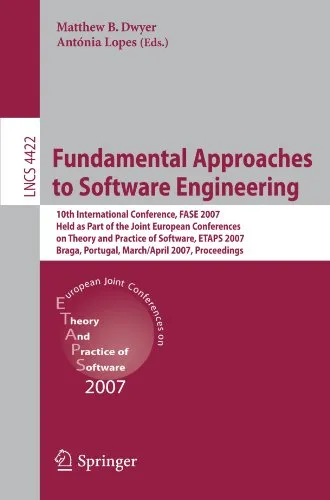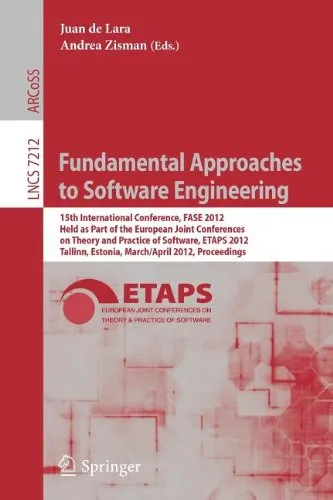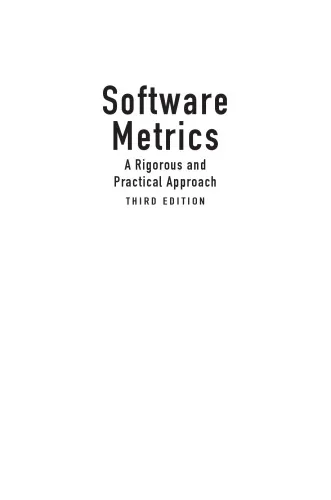Categories for Software Engineering
4.0
بر اساس نظر کاربران

شما میتونید سوالاتتون در باره کتاب رو از هوش مصنوعیش بعد از ورود بپرسید
هر دانلود یا پرسش از هوش مصنوعی 2 امتیاز لازم دارد، برای بدست آوردن امتیاز رایگان، به صفحه ی راهنمای امتیازات سر بزنید و یک سری کار ارزشمند انجام بدینکتاب های مرتبط:
معرفی کتاب «Categories for Software Engineering»
کتاب «Categories for Software Engineering» نوشته خوزه ل. فیادرو (José L. Fiadeiro)، یکی از آثار پیشرفته و تخصصی در زمینهی استفاده از ریاضیات پیشرفته و نظریه مقولات (Category Theory) در مهندسی نرمافزار است. این کتاب به طور خاص به بررسی اینکه چگونه مفهوم Category Theory میتواند به ارائه زبانهای مدلسازی بهتر، نمایش رسمی تفسیرپذیر و تحلیل سیستمهای پیچیده در نرمافزار کمک کند، میپردازد. در این معرفی، خلاصهای جامع، نکات کلیدی، نقل قولهای معروف، و اهمیت این کتاب مطرح خواهد شد.
خلاصهای مفصل از کتاب
«Categories for Software Engineering» به بررسی نقاط اتصال میان ریاضیات انتزاعی و اصول مدلسازی نرمافزار پرداخته است. نویسنده در این کتاب، به توضیح چگونگی تطبیق مفاهیم اساسی نظریه مقولات (مانند Functors، Morphisms، و Commutative Diagrams) با مشکلات و چالشهای عملی در طراحی نرمافزار میپردازد. این اثر در چندین فصل به تفصیل روشهایی را ارائه میدهد که توسعهدهندهها و مهندسان نرمافزار میتوانند از ابزارهای ریاضیاتی برای شناسایی بهتر نیازمندیها، طراحی معماریهای پیچیده و تحلیل سیستمهای پویا بهرهمند شوند. همچنین کتاب نشان میدهد که چگونه مفهوم Composition در Category Theory با مفاهیمی مانند ترکیبپذیری (Composability) در نرمافزار قابل تطابق است.
یکی از ویژگیهای برجسته این کتاب، ارائه نمونههای عملی و کدهای ریاضیاتی است که خواننده را قادر میسازد ایدهها را به صورت کاربردی در پروژههای خود اعمال کند. این کتاب نه تنها برای دانشجویان حوزه علوم کامپیوتر، بلکه برای متخصصان نرمافزار نیز منبعی ارزشمند به شمار میآید.
نکات کلیدی که از کتاب میآموزید
- درک مفهوم انتزاعی Category Theory و کاربردهای آن در مهندسی نرمافزار.
- چگونگی استفاده از Functors و Natural Transformations برای مدلسازی سیستمهای نرمافزاری تطبیقپذیر.
- استفاده از Commutative Diagrams به عنوان ابزاری برای تجزیه و تحلیل رابطه میان اجزای نرمافزاری.
- ایجاد زبانهای رسمی برای تعریف الزامات و تحقق معماریهای سیستم.
- چگونگی تحلیل رفتار سیستمهای پیچیده و پویا با استفاده از اصول Composition در Category Theory.
نقل قولهای معروف از کتاب
"The power of abstraction in Category Theory lies in its ability to unify seemingly disparate concepts under a common framework."
"Category Theory offers software developers not just a way of thinking, but a universal language of structure."
چرا این کتاب اهمیت دارد؟
در عصر امروز که سیستمهای نرمافزاری به طور فزایندهای پیچیده و توزیعشده میشوند، استفاده از ابزارهای انتزاعی برای مدیریت این پیچیدگی امری حیاتی است. نظریه مقولات به عنوان یکی از شاخههای پایهای ریاضیات، رویکردی جهانی برای تحلیل و مدلسازی ساختارها و روابط پیچیده ارائه میدهد. کتاب «Categories for Software Engineering» این ابزار را در دسترس مهندسان نرمافزار قرار میدهد و به آنها کمک میکند تا بتوانند نرمافزارهایی مقیاسپذیرتر، کارآمدتر و قابل اطمینانتر بسازند.
اهمیت دیگر این کتاب در این است که تمرکز آن بر انتقال دانش از حوزه تئوری به سمت کاربرد است. این کتاب برای کسانی که به دنبال آن هستند تا علم انتزاعی را در پروژههای واقعی خود به کار ببرند، یک منبع بینظیر است. همچنین با ترکیب نظریه و مثالهای عملی، این اثر میتواند پلی میان دنیای ریاضیات نظری و مهندسی نرمافزار کاربردی باشد.
Introduction to "Categories for Software Engineering"
In an ever-evolving field like software engineering, the tools and methodologies we use to specify, design, and analyze complex systems must continuously adapt and improve. "Categories for Software Engineering" is a groundbreaking book that bridges the worlds of software development and mathematics by introducing the field of category theory as a formal yet practical foundation for modern software engineering.
Written with both academic rigor and a focus on real-world applications, this book serves as an essential guide for software engineers, architects, and researchers who aim to approach their craft with greater precision and formalism. By unpacking the dense but powerful concepts of category theory, the book equips readers with tools to navigate abstractions, manage complexity, and achieve clear, modular designs. This is not just a theoretical treatise; it is a roadmap to better thinking and better software.
Detailed Summary of the Book
"Categories for Software Engineering" first introduces the fundamental concepts of category theory, such as objects, morphisms, functors, and natural transformations. It presents these ideas in an accessible manner, removing the intimidating barriers often associated with advanced mathematics. Through engaging examples and structured explanations, readers learn how these abstract notions directly apply to software engineering tasks.
The book methodically explores how category theory can be applied across various areas of software engineering, such as software modeling, specification languages, formal verification, and API composition. Each chapter builds a coherent narrative, demonstrating how the concepts can be applied to improve the way we design and reason about systems.
By the latter sections of the text, the reader is guided toward advanced topics such as monads (essential in functional programming), adjunctions, and limits, which illuminate deeper insights into modularity, composability, and reusability in software systems. Case studies and exercises solidify the connection between the theoretical constructs and practical design patterns, ensuring a fully rounded and applied understanding.
Key Takeaways
- A comprehensive introduction to category theory, presented specifically for software engineers.
- Practical applications of functors, monads, and natural transformations in modern programming languages and paradigms.
- Detailed explanations on how to design modular and composable software systems using categorical abstractions.
- Insights into the alignment of category theory with functional programming and object-oriented design methodologies.
- A structured approach to formal reasoning, enabling software developers to better manage the challenges of complexity and correctness in system design.
Famous Quotes from the Book
“Mathematics is not just a language for expressing software systems; it is a methodology for exploring their design space.”
“Category theory gives us a way to step back and see software not just as a collection of instructions, but as a dynamic system of interrelated concepts.”
Why This Book Matters
In modern engineering disciplines, the ability to generalize, abstract, and formalize is crucial for managing complexity and scalability. Software engineering, despite its mathematical underpinnings, has often relied on ad-hoc and informal approaches to design, which can cause difficulties in understanding, maintaining, and verifying large-scale systems. This book fills that gap by teaching software engineers how to think categorically—enabling them to reason about programs and systems at a higher level of abstraction and precision.
The application of category theory in software development has had a profound influence on the evolution of functional programming (e.g., in languages like Haskell and Scala) and even object-oriented design. By learning these principles, readers can gain a competitive edge in understanding cutting-edge techniques that have reshaped how we think about computation and system design.
Beyond practicality, this book also inspires readers to think of software engineering as part of a broader intellectual and creative pursuit. It challenges readers to elevate their perspective from the nitty-gritty of code to the elegance of systems and relationships, redefining what it means to 'engineer' software in the modern era.
دانلود رایگان مستقیم
شما میتونید سوالاتتون در باره کتاب رو از هوش مصنوعیش بعد از ورود بپرسید
دسترسی به کتابها از طریق پلتفرمهای قانونی و کتابخانههای عمومی نه تنها از حقوق نویسندگان و ناشران حمایت میکند، بلکه به پایداری فرهنگ کتابخوانی نیز کمک میرساند. پیش از دانلود، لحظهای به بررسی این گزینهها فکر کنید.
این کتاب رو در پلتفرم های دیگه ببینید
WorldCat به شما کمک میکنه تا کتاب ها رو در کتابخانه های سراسر دنیا پیدا کنید
امتیازها، نظرات تخصصی و صحبت ها درباره کتاب را در Goodreads ببینید
کتابهای کمیاب یا دست دوم را در AbeBooks پیدا کنید و بخرید
1261
بازدید4.0
امتیاز0
نظر98%
رضایتنظرات:
4.0
بر اساس 0 نظر کاربران
Questions & Answers
Ask questions about this book or help others by answering
No questions yet. Be the first to ask!
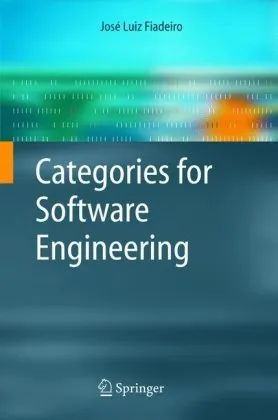




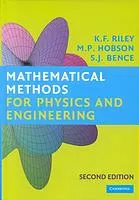

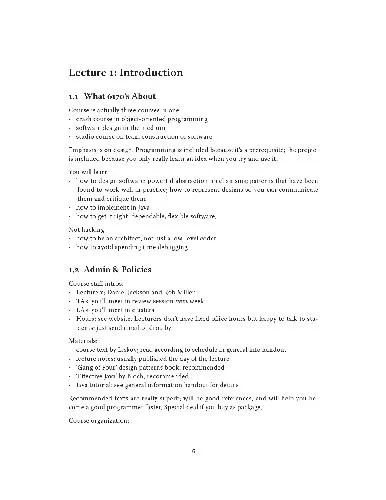
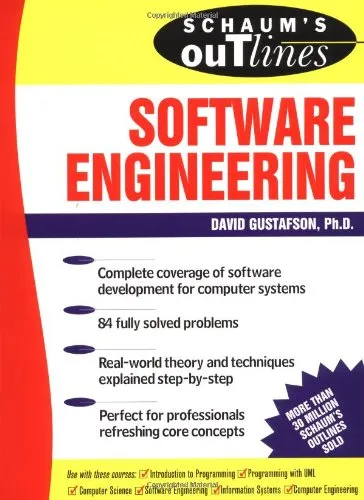
![Fundamentals Of Software Engineering, 5Th Ed [Paperback] Mall](https://s3.refhub.ir/images/thumb/Fundamentals_Of_Software_Engineering__5Th_Ed__31573.webp)

